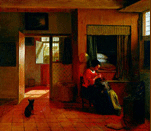










12.
English Catholic Women’s Lives
Organizers:
In the special circumstances of post-reformation England, women who remained Roman Catholic or converted to Catholicism occupied complex positions. On the one hand, women who understood themselves to be Catholic, whether or not they were ever convicted of recusing themselves from Church of England services, exercised considerable authority and independence. They might have a different confessional allegiance than their husbands or fathers; they might maintain the family’s religious identity and oversee its observance while their husbands strategically conformed; they might shelter the very priests to whom they confessed their sins, risking their own lives in the process. Women who joined convents abroad might serve as abbesses, raise money, translate important texts, or harbor queens in exile. On the other hand, Catholic women had particular vulnerabilities. Subject to penal laws, some spent time in prison. They might be betrayed by their own servants; they might lose their voice in their children’s educations and vocations. They were particular objects of vituperation, regarded as traitors to their husbands and to their monarch, malign influences on their children, seducers of their intimates. Their enemies used recusant women’s relationships with their confessors/biographers in order to impugn the sexual reputations of both parties.
This workshop will invite participants to read and discuss brief excerpts from a range of biographical accounts of Catholic women’s lives in order to discuss these complex positionings. While the Lives of author Elizabeth Cary, Lady Falkland and martyr Margaret Clitherow have received critical attention, the many other biographies of English women have received very little notice. Biographies of privileged women such as Lady Magdalen Viscountess Montague, Mrs. Dorothy Lawson, Lady Trevor Warner, Catherine Burton, Dame Gertrude More, and Dame Lucy Knatchbull were written by priests who had served as their “ghostly fathers” or confessors, either in convents or in the women’s households, often when the priests were “harbored” or hidden there. Some of the Lives existed only in manuscript, or were published on the continent. As a consequence, the texts raise fascinating questions regarding authorship, mediation, and readership. Since most of these biographies seem to have been written some years after the women’s deaths, and cannot be precisely dated, they provide an interesting perspective on periodization since they are a step removed from the years they describe, and suggest continuities across the seventeenth century and into the eighteenth. Since Englishwomen who joined convents after the reformation had to relocate to the continent, their experiences there offer valuable insights into women’s travels and relationships across geographical and language barriers. These texts are a rich resource for understanding Catholic women’s relation to degree, priority, and place. They also constitute a literary subgenre and reward careful textual analysis and attention to the conventions that connect them.
Participants will read selections from these Lives representing women who were converts and stalwarts, martyrs and survivors, wives, widows, mothers, and nuns. During the workshop itself, facilitators will briefly introduce a variety of disciplinary approaches to these texts in their particulars and in their interrelations, and the intersections and conflicts among these approaches. Each facilitator will discuss her own work with these texts and the challenges and rewards she encounters in working with them. Most of the workshop will be spent in group discussion, considering questions such as those the plenary will raise as well as questions about the texts’ historical, literary, and material value and interest , their purpose, how they do or do not idealize their subjects and with what consequences for us as post-modern readers, and how they compare to biographies and autobiographies of Protestant women. Participants are encouraged to share their own relevant research on life-writing, confessional differences among women, gender and spirituality, conscience and obedience, divisions among Catholic women, and domestic hierarchies.
Required Readings:
Readings for the seminar will include a total of 20 pages of excerpts from The Lady Falkland Her Life; Edward Scarisbrick’s The Life of the Lady Warner of Parham in Suffolk (London, 1691); Mr. John Mush’s Life of Margaret Clitherow; William Palmes, The Life of Mrs. Dorothy Lawson of St. Antony’s, near Newcastle-on-Tyne; and Sir Tobie Matthew, The Life of Lady Lucy Knatchbull.
|
|
|
||||||
|
|
 |
 |
|
||||
 |
|
 |
|
||||
|
|
|
||||||
|
|
|
||||||
 |
|
||||||
|
|
|
||||||
| |
|
||||||
 |
|
||||||
 |
|
||||||
 |
|
||||||
 |
|
||||||
|
|
|
||||||
|
|
 |
|
|
||||
 |
|
||||||
|
|
|
|
|
|
|
|
|